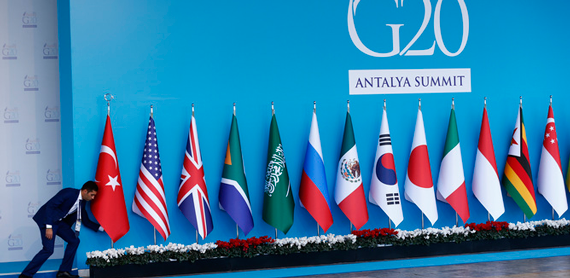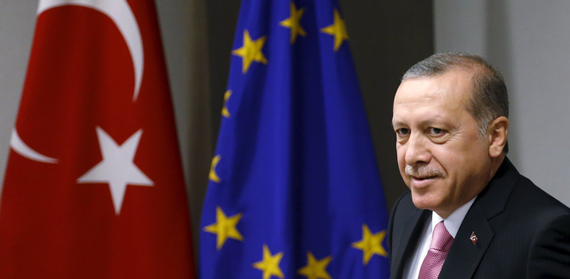Ready to go. Reuters/Murad Sezer
Guest post by Professor Alpaslan Özerdem, Head of Centre for Trust, Peace & Social Relations
Even before the horror of the November 13 attacks in Paris, the stakes for the 2015 G20 summit were high for all concerned. Now, the timing of this particular gathering could scarcely be more sensitive.
While the French president, François Hollande, will be staying in Paris to preside over a state of emergency, the other attendees are meeting with the Paris attacks at the top of the agenda – and in a country that itself faces deadly challenges.
Turkey has been in a state of dire political instability and violence since the inconclusive June 7 elections, after which the governing AKP failed to form a coalition government. When the country went to the polls again on November 1, the AKP won 49% of the vote and enough seats in parliament to form a government – but not before a dramatic uptick in the campaign against the Kurdish PKK and a terrible bombing in Ankara, the worst terrorist attack in the country’s history.
The November result came as a total surprise to many Turks, including the leaders of the AKP. All the polls predicted that the makeup of parliament would stay more and less the same, but in the end, the Turkish and Kurdish nationalist parties alike lost a significant chunk of their parliamentary seats, and all the possible post-election scenarios discussed before the elections were rendered moot.
It seems that after a period of intensive insecurity, the public opted for a shot at stability. And in theory, a return to stable single-party government offers a great chance to restore Turkey’s international clout. In particular, president Recep Tayyip Erdoğan clearly hopes a smoothly run summit can help repair his own tainted international image, which has never recovered since the crackdown on the Gezi Park protests of 2013.
This slow restoration is already underway. The Syrian refugee crisis has already made Turkey and its leaders a critical player for Europe. There is now an overall realisation that unless Turkey decides to stop the flow of refugees, this will be a non-stop process in the foreseeable future and the European Union countries are already in a total disarray with each other in coming up with a joined up response to this humanitarian crisis.
Getting back out there: Recep Tayyip Erdoğan. Reuters/Francois Lenoir
The situation has become so critical for Europe that German chancellor Angela Merkel decided to convene emergency meetings with Turkey’s leaders just before the November elections.
In return for Turkey sealing its European borders and re-accepting some of those Syrian refugees who have fled across them, Merkel has promised to speed up Turkey’s long-stalled EU membership talks, to allow visa-free EU entry for Turkish citizens much sooner than expected, and to bundle a significant financial aid package to help look after Syrian refugees in Turkey.
Similarly, the crisis has already been greatly exacerbated by Russia’s Syrian intervention, and the precarious dynamics of the region are such that Turkey’s vital importance for Western interests can no longer be overlooked. That in turn means that the US and EU cannot afford to upset the AKP government.
Shaky ground
Still, Turkey doesn’t hold all the aces. If it wants to restore its international profile and once again become more than a partner of necessity, it will need to show signs of returning to its pre-2013 levels of stability and security.
However, in recent months the fighting between the security forces and PKK has intensified so much so that nobody now talks about the peace process that seemed so promising only a year ago.
If the already shaky economy really starts to falter, then Turkey will have to deal with yet more social unrest. And to make matters worse, years of cynical and divisive politics have laid the ground for a devastating Balkan-style disintegration along sectarian and ethnic lines.
Still, nothing is guaranteed, and we can still hope that the 2015 G20 Summit will be remembered for the right reasons. It could be a stirring demonstration of global co-operation after the worst violence in France since World War II.
Equally, Turkey may yet use it to turn over a new leaf both domestically and internationally and become the reliable partner against extremism that the world needs it to be.
But these things will only be possible if its hosts and participants manage to hold their breath in an extraordinarily febrile and dangerous atmosphere.
Originally written for ‘The Conversation’.





Comments are disabled